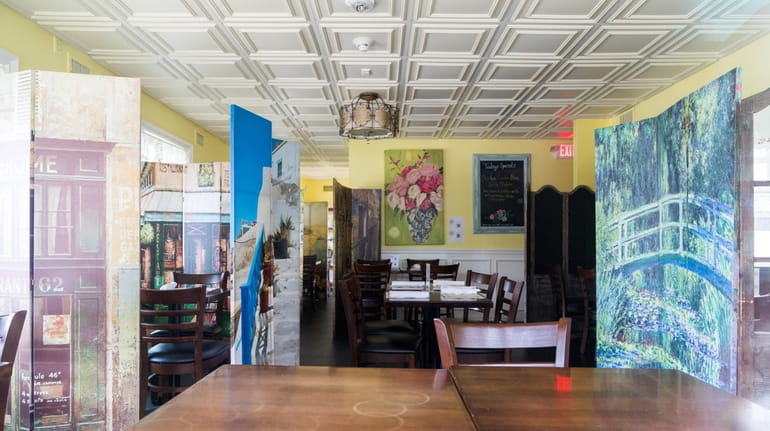Long Island restaurants temporarily close for winter 'hibernation' amid coronavirus pandemic

The Morning Rose Cafe in Bellmore has temporarily closed. Credit: Barry Sloan
The notices started appearing on Facebook the first week in January:
The LakeHouse in Bay Shore announced it "will be going into hibernation after today. We look forward to opening our doors again in March."
The Snapper Inn in Oakdale "decided to close Jan. 2 to March 4. This decision comes from an abundance of caution for our guests and staff."
Morning Rose Cafe in Bellmore closed until further notice. "As you all know," wrote owner Rose Tzanetos, "these are very difficult times and I do not want to risk the health and safety of my staff or guests until things improve. We will definitely be back and look forward to better times."
The decision was one that no restaurateur took lightly. Tzanetos said that, during the warm weather, the combination of 50% capacity indoors and 10 new tables outside was enough for the business to hold its own. But now, with 24 seats inside and no outdoor dining, only a robust takeout business could have tided her over until the spring. "We specialize in gourmet brunch," she said, "and that doesn’t travel well." Whether one of her "Benedict selections" was packaged as a finished dish, or broken down into its components of poached egg, zucchini latke, roasted tomatoes and Hollandaise sauce, it was never going to survive the journey.
Eileen Connors considers herself lucky that she and her partners at the LakeHouse have plenty of room. "If you have a 40-seat restaurant at 50% capacity, how can you make it?" she wondered. After a month of only doing takeout, in June the restaurant welcomed back customers to dine at tables that were well-spaced indoors and sprawled all over the expansive patio and under a new tent in the parking lot. Revenue, which had dropped 70% in the second quarter (April through June), rebounded in the third quarter to more than 15% over the previous year.
"We were like squirrels this summer," she said, "taking every nut and saving it for the winter." And the winter looked bleak. Usually, during the cold weather, parties and business events go a long way toward keeping the bay-side restaurant afloat. "That can’t happen now," she observed.
The Snapper Inn which, like the LakeHouse, is on the water, always has its slowest months in January and February. "It’s about 25% of what we do in July and August said owner Richard Remmer. This year, with no parties booked, it promised to be much worse. And so, he took the opportunity to double down on repairs. "My family has had the restaurant for 90 years and there’s always a lot of work to do in the winter — plumbing, exhaust hoods, kitchen tile. So, this year, the contractors will be able to work all week instead of during off hours."
It may seem like a desperate measure, but hibernating is a luxury, only possible when a restaurant can forgo even a paltry pandemic-induced income because creditors are not at the door.
Like Tzenatos of Morning Rose Cafe, Remmer owns his building. "I don’t know how restaurants that pay rent have been able to survive," he said.
"You can’t do it without the help of your landlord," said Connors who praised her landlord for his willingness to make concessions during the pandemic. She was also grateful that she and her partners always had a policy of paying vendors immediately, without the customary 30- or even 60-day terms. "That meant we had no bills piled up when we decided to close."
All three restaurateurs understand that their employees will shoulder much of the burden of closure. "There’s unemployment," Remmer said, "but, particularly for servers who count on tips, it’s going to be hard. But on the other side," he said, "I’m concerned about the high COVID numbers. If we are open, we are potentially part of the problem."
Tzenatos noted that, as required by the health department, she keeps a log of employees in which they must report if they’ve come into contact with anyone who has tested positive. "But it’s vague — what does ‘you’ve come into contact’ mean? I have a tiny kitchen and, since I’m only open until 3 p.m., a lot of my employees work at night in other restaurants. I’m looking at a situation in which someone could get sick at my restaurant, or that my entire staff could have to quarantine. That hangs over your head."
Connors also worries about her employees, "especially the dining room people. The other day, one of our customers was giving a server a hard time because he said nothing had any taste. She came and told me and I said ‘oh my God that’s a symptom of COVID.’"
Connors said that LakeHouse had spent $50,000 on UV lights, HEPA filters, pandemic tents, plexiglass barriers and other safety measures. But she is still nervous at the prospect of having four households dining at one table. The LakeHouse will reopen when the surge has decreased and the vaccine is more readily available. "At that point, we'll be drinking Champagne out of our shoes."
Tzanetos said, "between people getting the vaccine and the warmer weather, there should be more clarity about the situation in March." She knows that her employees could get other jobs, that her clients could find other purveyors of eggs Benedict (though probably not zucchini-latke eggs Benedict), but she’s not too worried. "Most of my staff has been with me for the whole 7½ years I’ve been open. And I know my customers, they have always supported me and I know they will come back."
